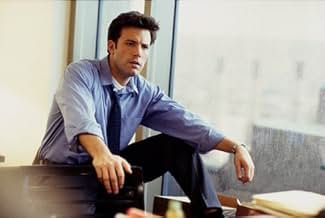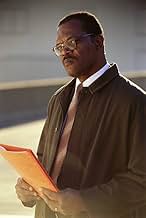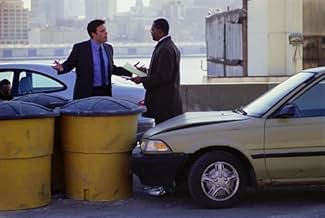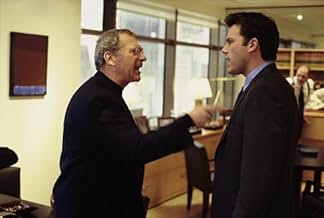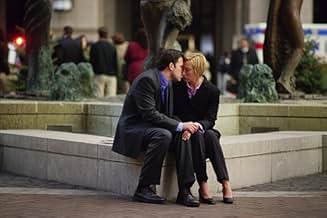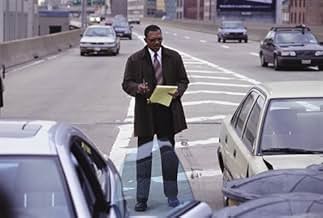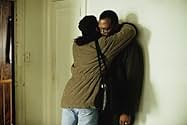La storia di un giorno a New York, quando un giovane avvocato e un uomo d'affari hanno un piccolo incidente d'auto lungo la FDR Drive e la loro rabbia sfocia in una lotta volta a rovinare l'... Leggi tuttoLa storia di un giorno a New York, quando un giovane avvocato e un uomo d'affari hanno un piccolo incidente d'auto lungo la FDR Drive e la loro rabbia sfocia in una lotta volta a rovinare l'uno l'esistenza dell'altro.La storia di un giorno a New York, quando un giovane avvocato e un uomo d'affari hanno un piccolo incidente d'auto lungo la FDR Drive e la loro rabbia sfocia in una lotta volta a rovinare l'uno l'esistenza dell'altro.
- Regia
- Sceneggiatura
- Star
- Premi
- 7 candidature totali
- Mina Dunne
- (as Jennifer Dundas Lowe)
- Gina Gugliotta
- (as Lisa Leguillou)
Recensioni in evidenza
There are three main reasons why I checked out this movie: Samuel, L, Jackson. Needless to say, he's a terrific actor and worth seeing in whatever he does. He's one of my favorites, and he delivers another powerhouse performance, taking on a role somewhat different from his recent roles: he plays an average Joe. We're introduced to his character, Doyle Gibson, who's a very nice guy simply haunted by mistakes in his past, one being alcoholism, which led to a divorce. And now he's attending AA meetings and buying a house for his two kids, hoping he will attain custody of them. Ben Affleck is good and charismatic. I didn't sympathize as much with his character, but that doesn't make him an antagonist. Neither characters are saints, nor are they sinners. That's good, because it's never completely effective to include characters who are entirely sympathetic. They're both mature adults, but they resort to juvenile acts of revenge in hopes that they can undo what happened. Sydney Pollack is great, as Affleck's egotistical father-in-law, proving his talents in front of the camera are just as fine as his talents behind the camera. I wanted to see more of the beautiful Amanda Peet, but she only has approximately 7 minutes of screen time. So I'm guessing that topless scene I heard mentioned didn't make it to the final cut. Oh, well. William Hurt, who seems to do a movie every 5 years, unfortunately has a small, thankless role as an alcohol counselor.
The script is well-written, and the film is a lot more character-driven than ones of recent years. I loved that scene in the bar where Sam Jackson sits in a lonely bar, listening in on two white guys badmouthing Tiger Woods. He lashes back with a terrific monologue, and later ends up punching them out. Some directors would've cut that scene out, overly concerned about the film's pacing, but I'm glad this time that wasn't the case. However, the ending seems a little fake. It's just too happy for its own good. But that's the only element of the movie I found forced.
My score: 7 (out of 10)
High real world stakes.
Until the last ten d*** minutes when Afleck becomes essentially a super hero and fixes all the consequences for Jackson, despite how clear it was made throughout that most of these things could not be fixed.
Such an intelligent story ruined by one of the most careless yet brazen Hollywood endings in history.
I know *why* they make Hollywood endings, but I strongly suspect anyone that sat through this disturbing tale could handle a real ending. This ending is tantamount to all the dead people in Alien or one of the Hannibal Lecter movies all being AOK at the end.
Changing Lanes is much more complex than the trailer leads you to believe. From the preview, you'd think it is an action fan's over-revved, simple-minded revenge thriller with lots of vehicular mayhem. Believe it or not, it does more peeling back of the layers of insulation of the affluent/powerful end of the social spectrum than any film I have seen lately. (--And not in the way the disappointingly too-pat-to-downright-absurd 'John Q' did, either.)
It's a film noir, and one of the darkest at that, full of despair, cynicism and scathing revelations about human nature. It seems to say-- or really, and this is a major distinction, to be about characters some of whom believe-- that we all make deals of personal expedience with Morality, that no one escapes life formation uncompromised and therefore able to comment on or judge anyone else's choices or actions. It's the old amoral, nihilistic/relativistic universe routine, which says concepts of fairness, justice or morality are quaintly irrelevant, that stuff just keeps happening, always has and always will, que sera sera.
My favorite scene, which was revolting and ugly and creepy as anything in any horror film you can name, is when Affleck sits down in a fine restaurant to discuss with his wife the morality of the situation he has been sucked into and is getting in deeper by the hour. He recognizes rightly that his game of oneupmanship, and win-at-any-cost has gotten insanely out of control. He is beginning to question it all, everything in his life. He comes to his wife for solace, direction, insight, a hint of moral rectitude, any help she can offer. She helps him, alright-- by saying she knows he does dishonest things (like having an affair with a woman at the office, which up until she springs that, he thought was his little secret) and that she could have had an honest husband, if that was all she wanted. --Why would she make a scene over an infidelity and risk interrupting the flow of her resources, anyway, she asks. He splits the dinner, dazed and even more desperate. In the next scene we witness him doing more of those very things he has just been having moral anguish over. (Maybe he can't recognize the feel of moral anguish at first.)
The Affleck character has a tremendous amount at stake, courtesy a pretty nifty plot hook, that keeps him up to some very dirty tricks. Sure, he doesn't want to risk interrupting the flow of his resources, either. But I think it's clear that the real reason he keeps doing crummy things is because he is a man compulsively drawn to the rewards of a destructive mode of behavior. Others gamble or drink or eat too much. Affleck works the system, lying, cheating, and treating all people like garbage. That's his high, his inescapable need. He can't quit. (Late in the film, he agrees to hire an idealistic young intern because, he laughs uncontrollably to himself, he wants to see what the intern's optimism and altruism looks like after 5 years of hard weathering by his no-rules-in-life employer.) Affleck is sick, and while he finally recognizes that sickness, he resigns himself to keep doing the same thing because, as his boss tells himself, he is willing to believe he has done more good than harm at the end of the day. The Affleck character's motivations for being extra bad, in the episode of his life we glimpse here, are strong enough to keep Changing Lanes from being just another American psycho study; it's easy to believe we could turn Affleck, given a similar circumstance in our life.
The ending is a somewhat forced positive one, but not nearly as much a sell out as is usually the case with a made-by-committee major commercial film. I give the whole enterprise 8.5 out of 10 stars.
What I find interesting is that comments on this film tend to be regarding which side to take, with some saying Jackson is "vile" or Affleck is "selfish". And, really, that is part of the beauty of this movie -- we naturally want to pick a side, like one guy and dislike another. But they are both flawed people.
Affleck is selfish, cheats on his wife, cuts off a guy's credit, flees an accident... his only redeeming quality is he is the only non-corrupt member of a law firm, though that hardly makes up for his failings. Jackson has a terrible temper, breaks things, has little self-control and is an alcoholic. Sure, he wants to reunite with his kids, which is noble, but maybe he should not be able to. Even if he had received Affleck's insurance card, he still would have been late for court...
Lo sapevi?
- QuizA day after the terrorist attacks of September 11, 2001, director Roger Michell had the World Trade Center towers digitally removed from the opening main title sequence in the film. In the DVD commentary, he admitted that it was a mistake to erase them, and make it appear as if they did not exist. During the re-editing of the film, Michell reinserted them as a tribute.
- BlooperWhen Gavin Lights the paper on fire and raises it to the sprinkler head, that type of sprinkler head would only discharge the water. No other heads would spray water. The reason for this is to minimize damage.
- Citazioni
Doyle Gipson: I hope you don't mind, but I was intrigued by your conversation. I just thought you were in advertising. So I want to give you my dream version of a Tiger Woods commercial, okay? There's this black guy on a golf course. And all these people are trying to get him to caddy for them, but he's not a caddy. He's just a guy trying to play a round of golf. And these guys give him a five-dollar bill and tell him to go the clubhouse and get them cigarettes and beer. So, off he goes, home, to his wife and to their little son, who he teaches to play golf. You see all the other little boys playing hopscotch while little Tiger practices on the putting green. You see all the other kids eating ice cream while Tiger practices hitting long balls in the rain while his father shows him how. And we fade up, to Tiger, winning four Grand Slams in a row, and becoming the greatest golfer to ever pick up a 9-iron. And we end on his father in the crowd, on the sidelines, and Tiger giving him the trophies. All because of a father's determination that no fat white man - like your fathers, probably - would ever send his son to the clubhouse for cigarettes and beer.
- Curiosità sui creditiThanks to the staff and Militia Force members and veterans at the Marcy Avenue Armory, Brooklyn, New York.
- Versioni alternativeThere was an early review of the movie that contained a spoiler of the ending. The ending that was originally used involved Ben Affleck and Samuel L. Jackson getting into a fist fight that leads onto the balcony. They talk about right and wrong and Affleck takes the file and tears it up and the movie fades to credits. This ending was most likely cut because test audiences did not like it. It will most likely appear on the DVD. Also a small clip shown in the TV ads shows Affleck and Jackson fighting on the balcony. This was part of the original ending which explains why it was cut.
- ConnessioniFeatured in Changing Lanes: The Writer's Perspective (2002)
I più visti
- How long is Changing Lanes?Powered by Alexa
Dettagli
- Data di uscita
- Paese di origine
- Lingua
- Celebre anche come
- Fuera de control
- Luoghi delle riprese
- Aziende produttrici
- Vedi altri crediti dell’azienda su IMDbPro
Botteghino
- Budget
- 45.000.000 USD (previsto)
- Lordo Stati Uniti e Canada
- 66.818.548 USD
- Fine settimana di apertura Stati Uniti e Canada
- 17.128.062 USD
- 14 apr 2002
- Lordo in tutto il mondo
- 94.935.764 USD
- Tempo di esecuzione
- 1h 38min(98 min)
- Colore
- Mix di suoni
- Proporzioni
- 2.35 : 1


